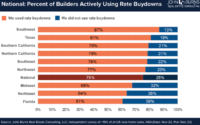Debt Costs Are Soaring in Europe
(Bloomberg) — The cost of funding for companies in Europe is now more expensive than during the early pandemic turmoil.
Most Read from Bloomberg
Average yields on euro-denominated high-grade bonds closed at 2.06% on Thursday, just edging above the coronavirus peak reached in late March 2020, based on data compiled by Bloomberg. They now stand at their highest level since early 2014.
It’s the latest negative milestone for Europe’s credit market, which is officially going through its worst-ever selloff. Investors are getting hit from every angle, with persistent inflation raising the prospect of central bank action and concerns about an economic slowdown boosting risk premiums.
“Central bank tightening into a weak growth environment is not a scenario that developed markets have faced for decades – and we suspect that risk assets will not take it well,” Barclays credit strategists Soren Willemann and Zoso Davies wrote in a note to clients on Friday. “Given myriad uncertainties and factors beyond the scope of our analysis, we recommend treading carefully.”
The benchmark index in Europe is down 2.53% in total return terms in April, putting it on track for its worst monthly performance since the early days of the global pandemic. It will also mark the fifth consecutive month of losses, the longest negative streak since early 2018, when the drops were nowhere near as sharp.
Meanwhile, an earlier relief rally in corporate risk premiums has almost entirely reversed, amid news this week that Russia is cutting off some countries from its gas distribution until they accept demands to pay in roubles. Recession scares are also intensifying, as the U.S. economy shrank unexpectedly in the first quarter for the first time since 2020.
It’s a similar situation across major corporate debt markets, with yields in the global Bloomberg benchmark less than 3 basis points below their Covid-19 peak of 3.69%.
The abundance of risks are mostly keeping companies away from raising new debt. Debt offerings from Gucci owner Kering SA and Philips NV ended the longest dry spell for Europe’s corporate debt sales since 2020. In the U.S., sales this week were running nearly 60% below the $20 billion that dealers projected to materialize.
For investors who have long complained about the lack of value in the safest parts of the credit market, it is a chance to snap up yields they haven’t seen in years.
“We feel fairly comfortable that the fundamental backdrop is supportive for credit,” said Michael Buchanan, deputy chief investment officer at Western Asset Management, in a presentation after the release of the U.S. GDP figure on Thursday. “We see good opportunities in the next two to three quarters but that doesn’t mean there will be no interim volatility along the way,” he said.
Most Read from Bloomberg Businessweek
©2022 Bloomberg L.P.
[ad_2]
Source link


